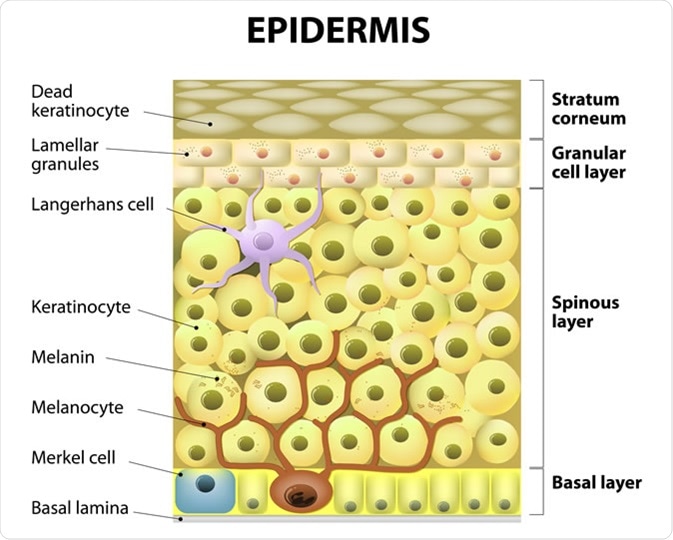Melanin is a complex polymer derived from the amino acid tyrosine. Melanin is responsible for determining skin and hair colour and is present in the skin to varying degrees, depending on how much a population has been exposed to the sun historically.

Layers of epidermis. Structure of the human skin. Image Credit: Designua / Shutterstock
Melanin synthesis
Numerous steps are involved in the biosynthesis of melanin. The first step is catalysis of the chemical L-3,4-dihydroxyphenylalanine by tyrosinase. A lack of tyrosine can lead to albinism. Tyrosine is only found in a specialized cells called melanocytes, inside which tiny granules of melanin pigment are contained in vesicles called melanosomes.
These melanosomes leave the melanocytes and move into other cells in the epidermis. Mostly brown or black in colour, melanin deposits determine the skin pigment which varies depending on the number and distribution of the melanosomes. Aside from determining skin colour, the light absorbent melanin protects the DNA against UV radiation from the sun and it is considered a potential candidate in melanoma treatment.
Melanin is found in several areas of the human body including:
- Skin where it provides skin color
- Hair
- Pupils or irises of the eyes
- Stria vascularis of the inner ear
- Areas of the brain, the substantia nigra and locus coeruleus
- The medulla and zona reticularis of the adrenal gland
Types of melanin
Some of the different types of melanin include eumelanin, pheomelanin and neuromelanin. Eumelanin is found in the hair, skin and dark areas around the nipples. It is particularly abundant among black populations and provides black and brown pigment to the hair, skin and eyes.
When eumelanin is present only in small amounts, hair may be blonde.
Pheomelanin is also found in the hair and skin. This type of melanin provides pink and red colors and is the main pigment found among red-haired individuals. This type of melanin is not as protective against UV- radiation induced cancer as eumelanin.
Neuromelanin is a form of melanin found in different areas of the brain and loss of this melanin may cause several neurological disorders.
Further Reading
Last Updated: Nov 21, 2022